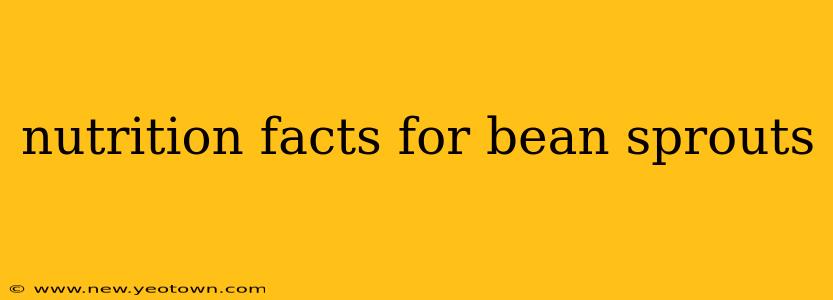Bean sprouts. Those delicate, crunchy little things often tossed into salads or stir-fries. But beyond their appealing texture, lies a nutritional powerhouse often underestimated. Let's embark on a journey to uncover the surprising nutritional facts about bean sprouts and why they deserve a prominent place in your diet.
Our story begins with the humble bean, a legume brimming with potential. Through a process of sprouting, this potential is unlocked, transforming the bean into a nutritional marvel. The sprouting process increases the levels of certain vitamins and enzymes, making bean sprouts even more beneficial than their unsprouted counterparts.
What are the Nutritional Benefits of Bean Sprouts?
Bean sprouts are incredibly low in calories, making them a perfect addition to weight-management diets. But their nutritional profile extends far beyond just calorie count. They're packed with essential vitamins and minerals, contributing significantly to overall health and well-being.
Let's break down the key nutritional components:
-
Vitamins: Bean sprouts are an excellent source of Vitamin C, a powerful antioxidant crucial for immune function. They also offer a good dose of Vitamin K, essential for blood clotting and bone health. Further, they contain smaller amounts of various B vitamins, vital for energy production and overall metabolism.
-
Minerals: These tiny sprouts are surprisingly rich in minerals. They're a good source of manganese, involved in bone health and metabolism, and offer decent amounts of folate (crucial for cell growth and development), iron (important for oxygen transport), and potassium (essential for maintaining healthy blood pressure).
-
Fiber: Bean sprouts contribute valuable dietary fiber, promoting healthy digestion and regularity. This fiber also aids in maintaining healthy blood sugar levels and contributes to satiety, helping you feel full for longer.
-
Protein: While not a primary source of protein, bean sprouts do offer a modest amount, adding to your overall protein intake. This protein is particularly important for vegetarians and vegans seeking diverse protein sources.
How Many Calories Are in Bean Sprouts?
A cup of bean sprouts generally contains around 20-30 calories. This low calorie count coupled with their high nutritional density makes them an ideal addition to almost any diet. Their low calorie nature means you can enjoy a generous portion without significantly impacting your daily calorie intake.
What are the Different Types of Bean Sprouts?
The world of bean sprouts extends beyond just one variety. Different beans yield different sprouts, each with its own unique flavor profile and nutritional nuances. Common types include:
-
Mung bean sprouts: These are perhaps the most commonly found and are known for their delicate flavor and crisp texture.
-
Soybean sprouts: Slightly larger than mung bean sprouts, soybean sprouts have a more assertive, nutty flavor.
-
Adzuki bean sprouts: These sprouts have a sweeter taste compared to mung bean or soybean sprouts.
-
Pea sprouts: These sprouts have a slightly sweet and peppery taste.
Are Bean Sprouts Good for Weight Loss?
Yes, bean sprouts can be a beneficial part of a weight-loss diet. Their low calorie count and high fiber content promote satiety, helping you feel fuller for longer and reducing overall calorie intake. Furthermore, the vitamins and minerals they provide support overall health and well-being, essential aspects of a successful weight-loss journey.
Are Bean Sprouts Good for Your Digestive System?
The high fiber content in bean sprouts promotes healthy digestion and regularity. The fiber adds bulk to your stool, making it easier to pass and preventing constipation. However, it’s important to note that introducing high-fiber foods gradually can minimize any potential digestive discomfort.
What are the Potential Downsides of Eating Bean Sprouts?
While generally safe and healthy, there are a few potential downsides to consider:
-
Foodborne illness: Like any raw vegetable, bean sprouts can harbor harmful bacteria if not properly grown and handled. Choose sprouts from reputable sources and ensure proper storage and preparation.
-
Allergic reactions: Individuals with legume allergies should exercise caution, as bean sprouts are derived from beans.
-
Goitrogens: Some bean sprouts contain goitrogens, compounds that can interfere with thyroid function. However, the amounts found in bean sprouts are generally considered insignificant for most individuals.
In conclusion, bean sprouts are a nutritional gem, often overlooked but worthy of a prominent place in a healthy diet. Their low calorie count, high nutritional density, and fiber content make them a powerful addition to any meal. Remember to choose them from reputable sources, handle them with care, and enjoy the numerous benefits they offer.

